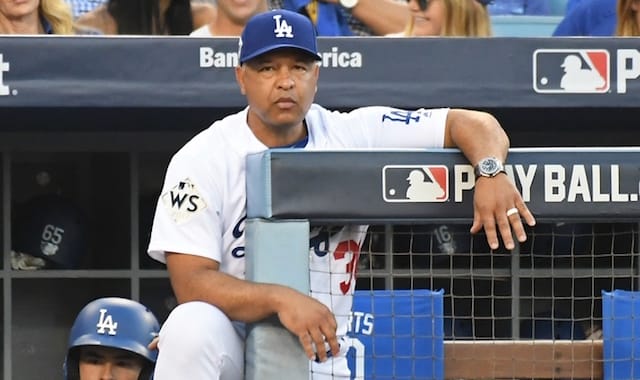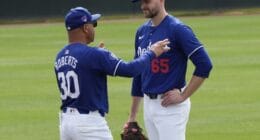Los Angeles Dodgers manager Dave Roberts played the odds in Game 2 of the World Series, and he crapped out. The Houston Astros rallied against a vaunted bullpen and came away with a win in extra innings to tie the series as it now shifts to Minute Maid Park for Games 3, 4 and 5.
Now, imagine you’re in Las Vegas and you find yourself sitting at a blackjack table, staring down the biggest bet of your life. As the cards come out, you get a pit in your stomach — you’ve got 12 and the dealer is showing a face card.
Doing the quick math, you realize you’ve got just a 31 percent chance of busting should you hit — so you do. Bummer, the dealer flips over a face card and you’ve got 22 — you’re out.
Then, to make matters worse, the dealer reveals their down card was just a five, and they quickly proceed to bust as well.
If only you hadn’t hit on 12, right? If only you had done the exact opposite of what basic strategy (and math) told you to do, right? Surely that was the right decision.
You see, sometimes, you can play the odds right, and still lose. But guess what? That still doesn’t mean the decision was wrong.
Well, unless you’re the Dodgers and Roberts. Because then, you know, it’s all your fault and you’re a moron.
As the dust had barely settled on the Dodgers’ Game 2 loss at Dodger Stadium, social media was already ablaze over how Roberts managed his bullpen. But did he really do anything wrong?
The first major decision came in the fifth inning, when Roberts lifted Rich Hill after just four innings of one-run ball (three hits, three walks, seven strikeouts and 60 pitches). Why remove Hill at that point?
Simple. It’s what the Dodgers do when the opposing lineup turns over for a third time through.
Furthermore, this from Washington Post in August:
The fact: Starting pitchers generally lose effectiveness with each trip through an opposing lineup. This season, MLB starters have limited opposing batters to a .736 OPS on their first time through the lineup, but those numbers go up to .783 and .800 on the second and third times through, respectively. By contrast, relievers have limited opposing batters to a .721 OPS their first time through a lineup. Basically, unless your name is Kershaw, the Dodgers believe they have better options than you in the late innings – which is why their other starters rarely exceed 100 pitches or six innings.
Did you catch that? In Major League Baseball this season, relievers held hitters to an on-base plus slugging percentage that was several points lower than starters facing a lineup for a third time.
But wait, it gets better.
If you’re going to criticize the decision to pull Hill, you also have to consider the subsequent decision of who to bring in and who was due up for the Astros? That was five consecutive right-handed batters, which made Kenta Maeda, noted righty killer, the optimal choice.
Maeda gave the Dodgers 1.1 innings while allowing just one hit. Tony Watson then came in and needed just one pitch to induce a double play. Just like that, the Dodgers were into the seventh inning with a two-run lead, thanks to Corey Seager’s home run in the bottom of the sixth.
Okay, so if we’re not going to crush the decision to pull Hill, then what next? Are we going to take Roberts to task for asking Brandon Morrow and Kenley Jansen to get nine outs?
Because if we are, was it an issue the four other times this postseason Roberts had asked the duo to combine for more than six outs? They did so in each of the three National League Division Series games, plus Game 2 of the Championship Series.
In those four instances, the pair allowed just five total baserunners in 10.1 IP, while striking out 10.
On Wednesday night, Roberts played the odds and he lost. And, you know, sometimes that happens when you’re playing the other team some consider to be the best in baseball. Just because the Dodgers lost doesn’t mean there’s blame to be placed on someone’s shoulders. Especially not Roberts’.





